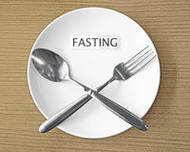Intermittent Fasting Can Be a Great Way to Lose Weight
Posted by Simple Girl on 21st May 2019

Intermittent Fasting (IF) has become common over the past few years. While many diets tell you what you need to eat, IF only asks you to space out your meals, whatever they may be. The idea is to put sizable gaps in your eating routine in order to help you eat fewer calories, keep your weight to a healthy level, and keep you away from diabetes or heart disease.
There are studies, however, that say that if you are a woman, the IF plan isn't as straightforward as it is for men. If you are to make it work for you, there are a few ideas that you need to keep in mind.
What exactly is intermittent fasting?
The most common IF approach has you going without food for 16 hours a day. Other plans include fasting twenty-four hours a day, or on alternate days.
Unlike regular diets that track your calories, in IF, you don't need to count anything. The plan says nothing at all about your diet. This makes it attractive to many people who find conventional diets too difficult. When they introduce fasts into their lives, they simply find a way to lose weight by eating infrequently.
Intermittent fasting comes with health benefits
Heart health: IF reduces the body's levels of bad cholesterol and triglycerides. It lowers blood pressure substantially. One study shows that after eight weeks of IF, pressure levels in participants came down by 6 percent.
Diabetes: IF can help lower the risk of diabetes. Fasting achieves this by lowering the body's insulin levels and lowering resistance to insulin. In one study done on 100 women, participants were found to lower their insulin resistance by 19 percent over a period of six months.
Weight loss: Many studies have shown that IF has as much effect on body weight as diets that have you restrict your calorie intake. Participants in studies were found to drop their body weight by up to 8 percent over a six-month period.
There are many other benefits, including better muscle mass preservation, and reduction in levels of inflammation.
There are different ways in which you can go about an IF plan
There is no one-size-fits-all approach to fasting. Women, in general, do better with a relaxed approach. They do better with shorter periods of fasting and fasting for only a couple of days each week. These are the best IF methods for women to use.
The Crescendo fasting approach: You fast for twelve hours a day, two days a week.
The Eat-stop-eat approach: You start with a 12-hour fast once a week, and gradually build up to a 24-hour fast twice a week.
The Fast diet approach: You only eat about 500 calories, or 25 percent of your usual caloric intake, doing this twice a week.
The Leangains approach: You fast for 14 hours a day and restrict yourself to doing all your eating within an 8-hour period during each of those days.
When you fast, you deny your body a certain amount of calories. For this reason, you need to make sure that you do supply your body with enough nutrition on the regular days.
It's important to understand that consistency is important. The best fasting plan for you is the one that your body takes well, and that you can sustain without giving up.

